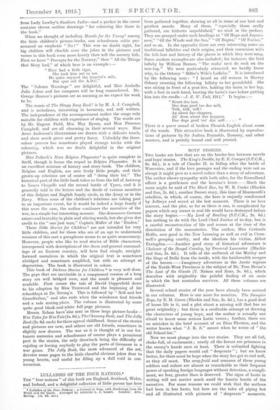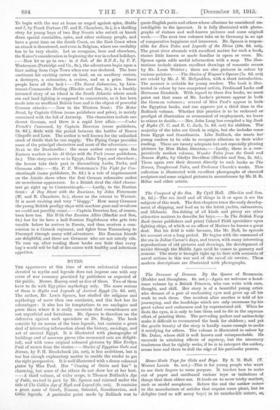BOYS' STORIES.
Two hooks aro here that are on the border-line between novels and boys' stories. The King's Double, by E. E. Cowper (S.P.C.K., 2s. 6c1.), is a tale of Charles IL in hiding after the battle of Worcester, and if the love passages and the ending were not so abrupt it might pass as a novel rather than a story of adventure. The author shows sympathy with both sides, for the Roundhead officer is a gentleman and the heroine's lover.—Much the same might be said of The Black Box, by W. B. Cooke (Blackie and Son, 2s. 6d.), another Dorset story, this time of Monmouth's rebellion, in which, of course, the hero is unjustly condemned by Jeffreys and saved at the last moment. There is no love interest, and the plot, so far as there is one, is complicated by papers which any owner in real life would have destroyed before the story begins.—My Lord of Reading (S.P.C.K., 2s. 6d.) has nothing to do with the Lord Chief Justice of to-day. but is a careful reconstruction of life and scones at the time of the dissolution of the monasteries. The author, Miss Gertrude Hollis, sees good in the New Learning as well as evil in Crom- well's grasping cruelty, and she idealizes his victim, Abbot Faringdon.—Another good story of historical adventure is Ohaloner of the Bengal Cavalry, by Percoval Lancaster (Blackie and Son, 2s. 6d.). It tells of the outbreak of the Mutiny and the Siege of Delhi from the inside, with the hairbreadth escapes of the heroes.—Imaginary adventure in the Arctic regions of the North-West Provinces is the subject of Mr. Tom Bevan's The Last of the Giants (T. Nelson and Sons, 3s. 6d.), which describes with originality the painful finding of an oasis in which the last mastodon survives. All these volumes are illustrated.
Several school stories of the year have already been noticed in our columns. Here is one more for mention. The Dampier Boys, by E. M. Green (Blackie and Son, 3s. 6d.), has a good deal of home life in it, and a plot about a missing will that has no great originality ; but there is a creditable attempt at drawing the characters of young boys, and the author is actually not afraid to insert seine serious Latin verses ; further, there are no mistakes in the brief account of an Eton Election, and the writer knows what " J. K. S." meant when he wrote of " the old School-list."
Now we must plunge into the war stories. They are all full, choke-full, of excitement ; nearly all the heroes are prisoners in the enemy's hands once at least. There is unlimited fighting that the daily papers would call " desperate " ; but we know better, for there must be hope when the story has got to end well, as they all must. The sangfroid and resource of these young soldiers and sailors are almost as remarkable as their frequent power of speaking foreign languages without detection, a compli• ment, we fear, greater than is deserved. The signs of haste in writing will not matter much amid the frantic hustle of the narrative. For some reasons we could wish that the authors had been in less haste, but here are the tales all piping hot and all illustrated with pictures of " desperate " moments. To begin with the war at home as waged against spies, Stubbs and I, by Frank Fortune (W. and R. Chambers, as.), is a thrilling story for young boys of two Boy Scouts who outwit or knock down special constables, spies, and other ordinary people, and have a great time on the South Coast, on the East Coast, when an attack is threatened, and even in Belgium, where our credulity has to be very elastic. Let us recognize, here and elsewhere, the Kaiser's consideration in beginning the war in school holidays. —Now let us go to sea : in A Sub. of the R,N.R,, by P. F. Westerman (Partridge and Co., 6s.), the adventures begin upon a liner sailing from Cape Town when war was declared. The hero continues his exciting career on land, on an auxiliary cruiser, a destroyer, a submarine, a cruiser, and on a prize. Some people have all the luck !—The Secret Submarine, by Lieu tenant-Commander Dorling (Blackie and Son, 5s.), is a frankly invented story of an island in the South Atlantic where much sea and land fighting is supposed to concentrate, as it has been made into an unofficial British base and is the object of powerful German attacks.—Now to the Western front: The Motor Scout, by Captain Gilson (same publishers and price), is mainly concerned with the fall of Antwerp. The characters include one decent German, and there is a rapid love affair.—Under French's Command, by Captain Brereton (same publishers, 3s. Od.), deals with the period between the battles of Neuve Chapelle and Loos. The author is well known for the unlimited. stock of thrills that he can supply. The Flying Corps provides some of the principal characters and most of the adventure. Next to the Dardanelles : the same author enters upon the Eastern warfare in his At Grips with the Turk (same publishers, 5e.). This story carries us to Egypt, Gaba Tepe, and elsewhere ; the heroes take their part in discomfiting Arabs; Turks, and Germans alike.—Mr. P. P. Westerman's The Fight for Con- staminople (same publishers, 2s. 6d.) is a tale of imprisonment on the Asiatic shore when the first German submarine makes its unwelcome appearance. In a British rival the chief charac- ters go right up to Constantinople.—Lastly, to the Russian front : A Boy Scout with the Russians, by John Finnemore (W. and R. Chambers, 5s.), shows us the retreat to Wargaw. It is most exciting and very " bluggy." How many Germans the young British prodigy slays with machine guns and revolvers we could not possibly count.—Captain Brereton has, of Course, been here too. His With Our Russian Allies (Blackie and Son, 6s.) has for its hero a, half-Russian Englishman who gets into trouble before he arrives in Russia, and then receives a com- mission in a Cossack regiment, and fights from Tannenberg to Przemysl through• many wild adventures. His Russian friends are delightful, and there are Germans who are not utterly vile. To sum up, after reading these books one feels that every boy's world will• be full of fire-eaters with healthy and infectious appetites.











































 Previous page
Previous page